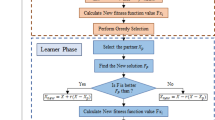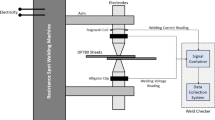Abstract
Welding is one of the fundamental manufacturing processes and is used for manufacturing components or assemblies with great strength in minimal time. Resistance spot welding (RSW) is utilized often as an efficacious method of joining for different works, most commonly in automobile and other industrial processes. Recent researches in welding are trending toward the economical process with optimum productivity. It is laborious to formulate a mathematical model for the analysis of RSW parameters, because of obscureness during the process with many parameters especially with the property of less operating time. A novel optimization method based on artificial immune algorithm (AIA) is presented in this article to find the optimum set of welding parameters for an economical process which offers the highest load carrying capacity at low power consumption.
Access this chapter
Tax calculation will be finalised at checkout
Purchases are for personal use only
Similar content being viewed by others
References
Jou M (2003) Real-time monitoring weld quality of resistance spot welding for the fabrication of sheet metal assemblies. J Mater Process Technol 132(1–3):102–113
Tsai CL, Papritan JC, Dickinson DW, Jammal O (1992) Modeling of resistance spot weld nugget growth. Weld J 71(2):47
Ates H (2007) Prediction of gas metal arc welding parameters based on artificial neural networks. Mater Des 28(7):2015–2023
Cevik A, Kutuk MA, Erklig A, Guzelbey IH (2008) Neural network modeling of arc spot welding. J Mater Process Technol 202(1–3):137–144
Kim IS, Son JS, Yarlagadda PKDV (2003) A study on the quality improvement of robotic GMA welding process. Robot Comput Integr Manuf 19(6):567–572
Darwish SM, Al-Dekhial SD (1999) Statistical models for spot welding of commercial aluminum sheets. Int J Mach Tools Manuf 39(10):1589–1610
Tseng HY (2006) Welding parameters optimization for an economic design using neural approximation and genetic algorithm. Int J Adv Manuf Technol 27(9–10):897–901
Bouyousfi B, Sahraoui T, Guessasma S, Chaouch KT (2007) Effect of process parameters on the physical characteristics of spot weld joints. Mater Des 28(2):414–419
Kahraman N (2007) The influence of welding parameters on the joint strength of resistance spot-welded titanium sheets. Mater Des 28(2):420–427
Hamedi M, Pashazadeh H (2008) Numerical study of nugget formation in resistance spot welding. Int J Mech 2(1):11–15
Pouranvari M (2011) Prediction of failure mode in AISI 304 resistance spot welds. Assoc Metall Eng Serbia Predict
Panda BN, Raju Bahubalendruni MVA, Biswal BB (2014) Optimization of resistance spot welding parameters using differential evolution algorithm and GRNN. In: 2014 IEEE 8th international conference on intelligent systems and control: green challenges and smart solutions, ISCO 2014—proceedings, pp 50–55
Lin WM, Gow HJ, Tsai MT (2011) An efficient hybrid Taguchi-immune algorithm for the unit commitment problem. Expert Syst Appl 38(11):13662–13669
Bakhouya M, Gaber J (2007) An immune inspired-based optimization algorithm: application to the traveling salesman problem. Adv Model Opt 9(1):105–116
Aickelin U, Dasgupta D (2013) Search methodologies : introductory tutorials in optimization and decision support techniques. Artificial immune systems. In: In: Burke EK, Kendall G (eds) Search methodologies—introductory tutorials in optimization and decision support technology, 2005, pp 1–29
Cisar P, Cisar SM, Markoski B (2014) Implementation of immunological algorithms in solving optimization problems. Acta Polytech Hungarica 11(4):225–239
Syahputra R, Soesanti I (2017) An artificial immune system algorithm approach for reconfiguring distribution network. AIP Conf Proc 1867
Wang M, Feng S, He C, Li Z, Xue Y (2017) An artificial immune system algorithm with social learning and its application in industrial PID controller design. Math Probl Eng 2017:1–13
Raju Bahubalendruni MVA, Deepak BBVL, Biswal BB (2016) An advanced immune-based strategy to obtain an optimal feasible assembly sequence. Assem Autom 36(2):127–137
Zhang Z, Liao M, Wang L (2012) Immune optimization approach for dynamic constrained multi-objective multimodal optimization problems. Am J Oper Res 02(02):193–202
Zandieh M, Fatemi Ghomi SMT, Moattar Husseini SM (2006) An immune algorithm approach to hybrid flow shops scheduling with sequence-dependent setup times. Appl Math Comput 180(1):111–127
Mohammad R, Akbarzadeh T, Davarzani Z, Khairdoost N (2012) Multiobjective artificial immune algorithm for flexible job shop scheduling problem. Int J Hybrid Inf Technol 5(3):75–88
Author information
Authors and Affiliations
Editor information
Editors and Affiliations
Rights and permissions
Copyright information
© 2020 Springer Nature Singapore Pte Ltd.
About this paper
Cite this paper
Uppada, S., Suraparaju, S.K., Bahubalendruni, M.V.A.R., Natarajan, S.K. (2020). Optimization of Process Parameters in Resistance Spot Welding Using Artificial Immune Algorithm. In: Deepak, B., Parhi, D., Jena, P. (eds) Innovative Product Design and Intelligent Manufacturing Systems. Lecture Notes in Mechanical Engineering. Springer, Singapore. https://doi.org/10.1007/978-981-15-2696-1_47
Download citation
DOI: https://doi.org/10.1007/978-981-15-2696-1_47
Published:
Publisher Name: Springer, Singapore
Print ISBN: 978-981-15-2695-4
Online ISBN: 978-981-15-2696-1
eBook Packages: EngineeringEngineering (R0)




